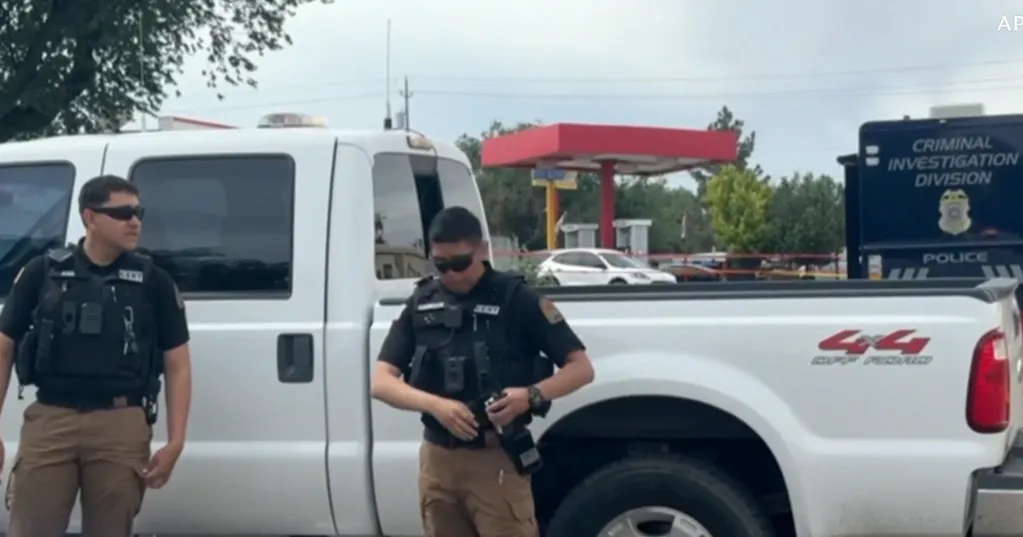Albuquerque, New Mexico -- Outside his motorcycle shop in Albuquerque, New Mexico, James Grice every day clears trash before he can open his doors to customers.
"All around the building, it's just a daily thing," said Grice, owner of J&L Motorsports, who added that he also sometimes has to clear away unhoused people. "Yeah...I got someone sleeping right there right now."
There are bullet holes in his shop's windows, and Grice and officers with the Albuquerque Police Department told CBS News they have a name for this part of the city, known as the Central Avenue Corridor: the "war zone."
The Central Avenue Corridor has seen shootings, assaults and drug abuse, including fentanyl, which reached a level that drove Albuquerque Police Chief Harold Medina in late March to issue a memo asking New Mexico Gov. Michelle Lujan Grisham for reinforcements.
"As you may know, we have made significant progress in reducing shootings and aggravated assaults along Central Avenue Corridor through a comprehensive approach to public safety centered on proactive police activity," the memo read. "However, sustaining this momentum requires immediate reinforcement."
According to a violent crime survey conducted by the Major Cities Chiefs Association, an organization representing police executives, the Albuquerque Police Department reported a drop in violent crime in recent months. It recorded 11 homicides in the first quarter of 2025, down from 21 in the same period in 2024. There were 48 rapes reported in the city in the first quarter of this year, down from 63 over the same period last year. The police department received 153 robbery reports, down from 232 robberies last year, and there were 895 aggravated assaults in the first quarter, down from 1,095 in the same period of 2024, the survey said.
Grisham, a Democrat, responded to the memo by declaring a state of emergency in April and authorizing the deployment of about 70 New Mexico National Guard members to the city. The National Guard spent May in training and arrived on Albuquerque's streets on June 5.
"I see drug dealing, drug use, prostitution," Grisham recently told CBS affiliate KRQE regarding the Central Avenue Corridor. "I worry about human trafficking. I see violence on the streets."
Those Guard members have been training in crisis intervention and de-escalation. And unlike the California National Guard troops that were deployed by President Trump earlier this month in response to protests in Los Angeles, the Guard members deployed by Grisham in Albuquerque are not armed or in military uniform, according to city officials.
"The intent of it all is to free Albuquerque police officers to be more available to the community, to answer calls for service, so that's in the capacity we'll be doing this," Maj. Gen. Miguel Aguilar, adjutant general for the New Mexico National Guard, said in briefing last month in Santa Fe.
Aguilar also said that 53 of the 71 Guard members deployed are from the Albuquerque area.
"We coach in the community, we work in the community, it's a little different when you talk about the national guard. I think it's important to understand that," Aguilar said.
During two homicide calls and a SWAT activation this week in Albuquerque, the job of the Guard members was to secure a perimeter. That freed up police officers who would have done that job to go back on the streets and respond to other calls, according to Albuquerque police.
"We need to stop playing games with crime," Det. Shaun Willoughby, president of the Albuquerque Police Officers Association, the department's union, told CBS News.
Willoughby has his doubts about the effectiveness of the Guard's impact so far. He believes the violence is too fierce for unarmed Guard members to help with.
"What are they going to do?" Willoughby asked. "They can't intervene. They don't have the authority to take anybody to jail. They're not armed. They're going to be in one of the most violent communities in this country, in a polo shirt, recognizing themselves as this helper, and they're limited onto what they can do."
Civil liberty advocates are uneasy with any plan that increases policing. Still, Grice says the city needs all the help it can get.
Grice said he has remained in Albuquerque because he needs to "make it work."
"I've got to support my family," Grice said. "I've got employees to worry about."
After CBS News finished speaking to Grice, it came across a crime scene in which Albuquerque police were investigating a possible homicide, just a block from the front door of Grice's business.
